NVIDIA $40B Arm Acquisition Creates Chip Superpower In Largest Semiconductor Deal Ever

The transaction represents an big shakeup in the tech industry with NVIDIA now wielding influence over the Arm microarchitecture that has shaped and powers nearly every aspect of modern electronics, from smartphones (there are over 1 billion smartphones sold globally each year), to televisions, to smart home devices and automobiles. NVIDIA in particular is interested in leveraging “Arm’s vast ecosystem” to accelerate its leadership in the area of artificial intelligence, while at the same time “expanding into large, high-growth markets.”
“In the years ahead, trillions of computers running AI will create a new internet-of-things that is thousands of times larger than today’s internet-of-people,” said NVIDIA CEO and founder Jensen Huang. “Our combination will create a company fabulously positioned for the age of AI.”
“Uniting NVIDIA’s AI computing capabilities with the vast ecosystem of Arm’s CPU, we can advance computing from the cloud, smartphones, PCs, self-driving cars and robotics, to edge IoT, and expand AI computing to every corner of the globe,” Huang added.
SoftBank originally purchased Arm for $31.4 billion back in 2016, and NVIDIA’s purchase price represents a small premium for SoftBank’s relatively short stewardship. NVIDIA has indicated that it will pay SoftBank $21.5 billion in stock, plus $12 billion in cash ($2 billion of which will come at the initial signing of the deal). The $40 billion transaction price also includes $5 billion in cash or common stock, if Arm meets certain “performance targets”. Finally, $1.5 billion in equity will be distributed to Arm employees. Barring any hiccups along the way, the transaction is scheduled to complete roughly one year from today.
It should be noted that despite being taken over by a U.S. based company, Arm will remain headquartered in Cambridge, England; and NVIDIA will “expand on this great site and build a world-class AI research facility, supporting developments in healthcare, life sciences, robotics, self-driving cars and other fields,” noted Huang. In addition, Arm’s IP will continue to be registered within the United Kingdom. Huang expanded on this European commitment in an email sent today to NVIDIA employees:
Arm gives us the critical mass to invest in the U.K. We will build a world-class AI research center in Cambridge — the university town of Isaac Newton and Alan Turing, for whom NVIDIA’s Turing GPUs and Isaac robotics platform were named. This NVIDIA research center will be the home of a state-of-the-art AI supercomputer powered by Arm CPUs. The computing infrastructure will be a major attraction for scientists from around the world doing groundbreaking research in healthcare, life sciences, robotics, self-driving cars, and other fields. This center will serve as our European hub to collaborate with universities, industrial partners, and startups. It will also be the NVIDIA Deep Learning Institute for Europe, where we teach the methods of applying this marvelous AI technology.
Arm has an all-star roster of licensees including Apple, Qualcomm, Microsoft, AMD, MediaTek, Samsung, and countless others. Apple has long employed Arm processor architecture in its iPhones and iPads, and will soon expand that availability with its in-house Apple Silicon that will power next-generation Macs. Likewise, Qualcomm is probably the most well-known maker of Arm-based chips in the Android smartphone market with its Snapdragon family of SoCs. These chips can be found in entry-level and mid-level products like the Google Pixel 4a (Snapdragon 730G) on up to the $2,000 Samsung Galaxy Z Fold 2 (Snapdragon 865+). NVIDIA also licenses Arm architecture for its Tegra processors, which can be found in its own-branded SHIELD TV family of 4K media streamers as well as the Nintendo Switch, Nintendo Switch Lite and it's array of Tegra processors for IoT and automotive devices. NVIDIA is sure to expand its reach well beyond these sectors with future Arm designs.
NVIDIA's Combined Efforts With Arm Will Target AI Supercomputing And Data Centers
However, perhaps the largest area of opportunity expressed on a combined NVIDIA-Arm analyst and press call this evening, would be AI supercomputing. Huang noted that the combined companies are "excited to accelerate the development of server CPUs," continuing on to note that Arm "Cambridge is going to be a site of growth" for NVIDIA and that "it will house the most advanced AI supercomputer the world has ever known, to bring in researchers from all over the world."
This deal is likely to come under regulatory scrutiny given the high-stakes tech players that are currently licensees of Arm technology. However, to quell fears for some, NVIDIA's CEO Juang noted that it will “continue to operate its open-licensing model while maintaining the global customer neutrality that has been foundational to its success.”
Even with these reassurances, at least two of Arm's co-founders expressed concern with NVIDIA’s big-time move, even before it was officially announced. "They are the semiconductor company that can buy Arm to destroy it—and it is very much in its interest to destroy Arm because they [would] gain a lot more than the $40 billion that they would pay for it," said Arm co-founder Hermann Hauser in early September.
Regardless, NVIDIA has come a long way since 2016 when SoftBank purchased Arm. Back in July 2016, shares of NVDA were trading at roughly $53, and the company had a market cap of just $30 billion. At the market close on Friday, September 11th, 2020, shares of NVDA were trading at $486.58 with a market cap over 10X that of its 2016 value at $300.22 billion. For comparison, Intel is now sitting at a market cap of $209 billion, making it the second most valuable American semiconductor supplier in the industry, second to NVIDIA.

